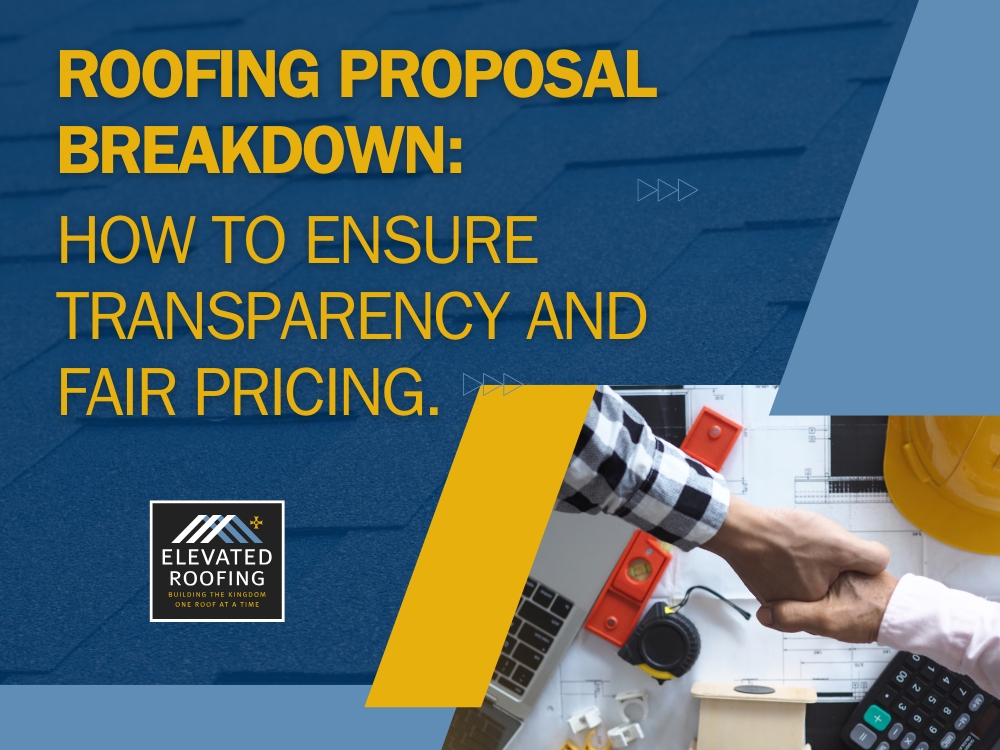A detailed roofing proposal is essential before starting any roof repair or installation. It should include a careful evaluation of your current roof and outline the best options to improve its condition. Choosing an experienced roofer ensures the work is done correctly and protects your investment.
If you are a homeowner, you will benefit from gaining a thorough understanding of the differences between roof estimates and roof proposals. Though roof estimates and roof proposals might seem fairly similar on their surface, there are numerous key differences between the two. Let’s take a look at the details of roof estimates and roof proposals to give you an idea as to what they encompass and why they are so important to homeowners as well as roofing contractors.
The Basics of Roof Estimates
A roof estimate explains exactly what types of materials will be used for the roof project. It also outlines the project’s schedule, describes the cleanup process, defines the contractor’s liabilities, and the type of warranty the roof will have. Furthermore, a roof estimate explains how the roof will be paid for and if there are any add-on costs. If add-on costs exist, they are explained in detail within the language of the estimate.
Though unscrupulous roofers will use an estimate as an opportunity to sucker customers into an open-ended contract, Elevated Roofing does the exact opposite. We put all the roofing project’s details in writing so you know exactly what you are getting and how much money it will cost. In the end, you should only do business with a roofing contractor who is willing to provide a highly detailed estimate that puts a time frame on the roofing project’s completion, clearly explains the company’s liabilities, describes the materials to be used, and clarifies the roof’s warranty terms.
 What About a Roofing Proposal?
What About a Roofing Proposal?
A roofing proposal sets a fixed price that the contractor and customer are bound to. Roofers worth their keep will have firmly established costs for materials and labor. The best roofers will not hesitate to specify costs for projects as a whole and further break down these costs based on project components.
This document should also address additional costs that are incurred due to code requirements. The proposal will set out the costs for everything involved in the roofing project: from materials to fascia, soffit, plywood sheets, and beyond.
The proposal should include a figure that will not be exceeded no matter what sort of hurdles pop up during the course of the roofing project. If you are uncomfortable with this number, do not agree to the proposal’s terms as there is a chance that the “not to be exceeded” figure will end up as the project’s total cost.
Be sure to discuss all the proposal’s nuances with the contractor so you know exactly what you will be charged for. As an example, some contractors will try to charge customers for travel time/costs, breaks, and other seemingly random “expenses.” Make sure the proposal contains all of the billing fees, broken down into nuanced details for your analysis.
If you disagree with these costs, do not be afraid to voice your concerns. Refrain from agreeing to a roof proposal until you are completely comfortable with all of its terms.
Keep in mind that roof proposals are not always the same across the board. These proposals differ by contractor, project, and customer demands. Some roofing contractors will provide lengthy proposals that span several pages while others will provide a single page proposal.
Do not accept an over-simplified proposal. Your roof is a major investment and a critically important component of your home. If the contractor refuses to break down the project’s costs, move on to a roofing company that is completely transparent about costs, materials, and project duration.
What Information Do You Need to Provide to Get a Roofing Proposal?
A roofing contractor can’t present you with an accurate and appropriate proposal if you don’t give the contractor the necessary information. The following are a few things a roofing contractor is probably going to want from you before being able to produce a proposal:
- A budget – You’re going to need to let the contractor know how much you’re looking to spend. It’s impossible to draw up a proposal for a customer if a contractor doesn’t know what your price range is because roofs can vary widely in cost.
- A timeframe for the start and completion of roofing repairs or installation – If you need your roof installation or repair done by a certain date or within a certain period of time, you need to share that information immediately to avoid problems later on.
- A description of the current problems that need to be corrected – Of course, the contractor needs to know why you’re contracting a roofer. Is your roof letting leaks in? Are your concerns aesthetic? What is the problem that you need to have resolved?
- Any material or aesthetic preferences you have – There are many options out there when it comes to roof appearance and material. While in some cases the best material for a given situation may be obvious, it isn’t uncommon for multiple materials to be appropriate and similar in cost. In that case, the final decision is made based on customer preference.
 What Factors Should Be Considered in a Roofing Proposal?
What Factors Should Be Considered in a Roofing Proposal?
When reviewing a roofing proposal, pay close attention to the key details your contractor should address. Important considerations include:
- The type, amount, and quality of materials that will be used
- An outline of the scheduling of the proposed project
- An explanation of liabilities the contractor will have in the project
- How any waste will be cleaned up
- What type of warranty the roof will have
- How the roof will be paid for
- Any add-on costs
What Should You Look at When Evaluating a Roofing Proposal?
You want a proposal that’s thorough and doesn’t leave much room for uncertainty and questioning. At the same time, you want to work with a contractor who is willing to answer your questions and address any concerns you do have after looking over the proposal.
Evaluate proposals by considering how well they’ve met your specifications. A contractor should work to meet your needs as much as possible.
In the end, the quality of the communication a contractor offers and how thoroughly the proposal details have been explained are probably the most important considerations in evaluating proposals.
Contact Elevated Roofing Today For a Free Roof Estimate
Elevated Roofing provides the assistance you need to repair roofing problems quickly or provide a full roof replacement. If you are looking for a Plano, Frisco, Allen, or McKinney area roofing company, take a look at our website to learn about the services we offer or call (469) 240-5236 today to schedule a free roof inspection.





Comments are closed